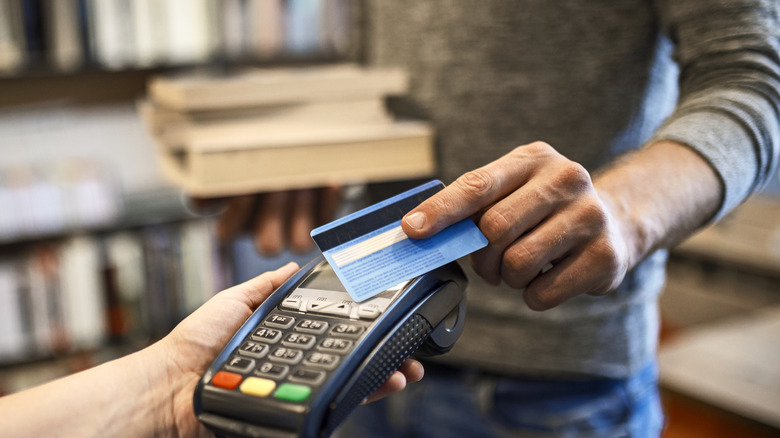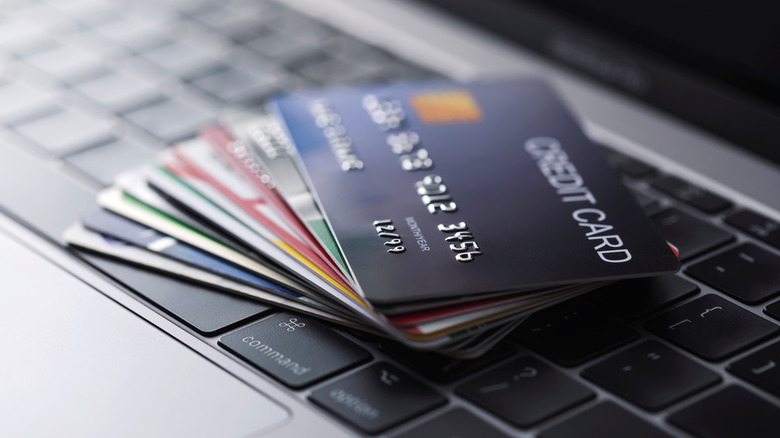Debit Card Vs. Credit Card: What's The Difference?
Chances are you've used a pin pad that's asked you to choose between credit and debit when checking out of a store. You might have wondered to yourself what the difference between the two was. While you might absentmindedly pick one option over the other, did you know that your choice can have implications for the store you're purchasing from? Debit and credit cards, while presented as interchangeable at registers, actually present very different options and implications for their users. While most people have some kind of debit card, not everyone elects to have credit cards.
One of the main things that distinguish debit and credit cards from each other is how they are used. While debit cards allow for easier access to cash and everyday purchases, credit cards can offer protections and rewards for larger specialty purchases. Debit cards also present smaller transaction processing fees for businesses (the Federal Reserve System has capped most debit fees at $0.21 plus 0.05 percent of the total) as opposed to credit card processing fees which usually include a flat fee and a much higher total percentage that can vary depending on your credit card company. This means that using a credit card, rather than a debit card, for a purchase can result in the business you're purchasing from receiving a smaller cut of the total you're being charged. This can be important to keep in mind, especially when supporting small or local businesses.
Debit cards explained
The main thing to know about debit cards is that they are connected directly to your bank account. This means that your spending limit is tied to the amount of money that is actually in your account at a given time (though some banks and accounts do offer overdraft protection in case of miscalculations). Debit cards are issued directly by your bank, and the money you spend is immediately charged to your account. This can make debit cards a more responsible choice for anyone looking to keep a tighter hold on their spending. They also offer easy transfers to and from savings accounts which can be helpful when dealing with daily banking needs as well as easy access to cash through ATMs.
With that being said, debit cards typically don't have points or reward systems. Also, since they are tied to a bank account, they will not help you build or improve your credit. Depending on your bank and account type, debit cards can face fees (especially when using different ATMs) but will not have any annual fees. It's also important to know that, in addition to a traditional debit card, there are also two kinds of debit cards that don't require a bank account to use. The first is an electronic benefits transfer (EBT) card which allows someone to easily access any benefits they might receive from state and/or federal agencies and programs, and the second is prepaid debit cards which can be preloaded with any amount.
Credit cards explained
Credit cards are, you guessed it, based on lines of credit. Depending on your spending limit, you can charge purchases, on credit, in a given month with the responsibility to pay back the amount. In addition to annual fees, credit card applications can also cause your credit score to drop for a full year after you apply for one — regardless of whether you are approved for the card or not. Unpaid balances can lead to interest and fees (also known as your annual percentage rate or APR) which can and will increase the total amount you will need to pay back on your initial purchases. It's also important to remember that your payment history accounts for 35% of your total credit score, so making sure to pay off your balances can be important for ensuring your financial history stays healthy.
Credit cards often offer points or rewards systems that can add extra perks to your purchases including cash back, travel, and/or discounts. This can help you get more bang for your buck by providing additional benefits just by making your regular purchases. Also, credit cards tend to have stronger fraud protections, which can help you avoid losing money in the event your card is stolen or used without your consent. Credit cards, with regular on-time payments, can also help you build or repair your credit which can be beneficial for any future loans, credit cards, and even rental applications you might need.


